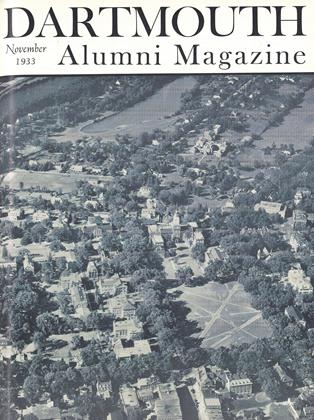IN SAYING farewell to the Dartmouth Christian Association the undergraduates have shed no tears. Nor will any except a very few in the recently graduated classes feel any sincere regret. To men of from ten to thirty years out of college the failure of the D. C. A. to maintain further existence on the campus may well be more of a shock; many alumni of this period have been, and will continue to be, interested in the causes that have brought about its dissolution. So natural has the action seemed, and so logical its several steps, that scarcely a ripple of contrary opinion has appeared to contradict the joint sentiment of the student cabinet and alumni committee of the D. C. A. that the organization should be submerged to give way to a new and young society, the Dartmouth Union. The Union now takes the D. C. A.'s place as the group most concerned with the spiritual growth and development of undergraduates. Its purpose, briefly stated, is to "unite in appropriate activity those students interested in finding the place of religion in life."
The Union first of all, from the implications of its name, wishes to develop a spirit of unity and sympathy between sects and religious points of view; it aims to be a union of faculty and students, being eager to bring faculty members and students together through informal evenings of music, discussion, entertainment, and conversation in faculty homes. In its statement of purpose the Union ineludes as many negatives as it does positives. Thus, it "does not attempt to define religion" nor does it "ally itself with any sect, creed, or philosophy." It "does believe that understanding of religious and moral values is a legitimate concern of college men." And the Union expresses concern that college men should understand "that critical world conflicts are being fought on frontiers of ethical conduct, integrity, and ideals; and that the origins and effects of these conflicts should have a place in higher education."
To realize these aims, and to promote these interests, the Dartmouth Union will experiment for one year. A cabinet of six undergraduates and the Director of Chapel will study the problem of ways and means, and initiate, direct, and terminate appropriate activities. For general supervision and counsel and to provide the wherewithal in the way of finances, a Union "Council" has been set up. This advisory group consists of three alumni, elected by the Alumni Council; three members of the faculty, first appointed by the President of the College and later to be chosen by the faculty; three representatives of the student cabinet; and the Director of Chapel.
In his Baccalaureate address in June, President Hopkins stated that "Any conception of education which holds that it can attain its ultimate possibilities unrelated to religion or exclusive of it is a fallacy." Although erected on a much broader base than its predecessor, the Union is likewise primarily concerned with religious and spiritual values. Its position is to encourage an intellectual approach to the subject, however, and to foster appreciation of things of the mind and spirit, qualities whose cultivation may contribute to the maturing of students in the College. For many years the D. C. A. filled an important niche in Dartmouth life. Its debility of recent years has turned to vim and vigor as the thoughtful Union and other active student groups have taken up its various functions. "Change is opportunity." To the Union goes our "good luck" for its experimental year.
 View Full Issue
View Full Issue
More From This Issue
-
 Sports
SportsFOLLOWING THE BIG GREEN TEAMS
November 1933 By C. E. Widmayer '30 -
 Article
ArticleHANOVER BROWSING
November 1933 By Rees H. Bowen -
 Class Notes
Class NotesClass of 1930
November 1933 By Albert I. Dickerson -
 Article
ArticleHistory of the Project
November 1933 By Prof. Artemas Packard -
 Class Notes
Class NotesClass of 1910
November 1933 By Harold P. Hinman -
 Class Notes
Class NotesClass of 1908
November 1933 By Laurence W. Griswold
Article
-
 Article
ArticleBOSTON "POTLATCH" GETS EDITORIAL COMMENT
March 1925 -
 Article
ArticleDirectory of Alumni Associations and Classes
DECEMBER 1930 -
 Article
ArticleThe Grant A ttacked
MARCH 1978 -
 Article
ArticleFor Women Only
Jan/Feb 2008 By Carolyn Kylstra ’08 -
 Article
ArticleA TEACHING LIBRARY
August 1944 By NORMAN K. ARNOLD -
 Article
ArticleThe '68 Who Runs the Supreme Court Building
SEPTEMBER 1988 By TERI ALLBRIGHT

